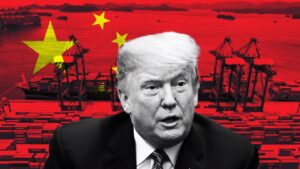In a surprising but calculated move during his presidency, Donald Trump announced that certain categories of electronics—most notably smartphones, laptops, and other consumer tech devices—would be spared from the latest round of tariffs imposed on Chinese imports. This decision, made during a tense period of escalating trade hostilities between the United States and China, carried significant implications for global supply chains, consumer pricing, and the tech industry at large.
Context: The U.S.-China Trade War
The Trump administration initiated a trade war with China in 2018, citing long-standing issues related to intellectual property theft, unfair trade practices, and the massive trade deficit between the two countries. Over the course of several months, the U.S. imposed tariffs on hundreds of billions of dollars’ worth of Chinese goods. In return, China retaliated with its own tariffs on American agricultural products and other exports.
The objective from the White House was to pressure China into agreeing to more favorable trade terms and curbing practices seen as harmful to American businesses. However, as tariffs escalated, so did the concerns from economists, corporations, and consumers alike, particularly about the rising costs of goods and the disruption of global supply chains.
The Electronics Exemption: A Tactical Retreat
On August 13, 2019, the Trump administration announced a partial delay and exemption of tariffs on some Chinese goods, including high-profile consumer electronics. Smartphones, laptops, video game consoles, monitors, and certain toys were among the items excluded from the immediate tariff list. This announcement marked a pivotal moment in the trade negotiations and economic strategy.
The reasons for the exemption were multifaceted:
- Consumer Impact: With the tariffs set to take effect ahead of the critical holiday shopping season, there were fears of significant price hikes on consumer electronics. Devices such as iPhones, MacBooks, and other gadgets manufactured in China were likely to become more expensive, potentially dampening consumer spending and affecting holiday retail performance.
- Corporate Pressure: Major tech companies, including Apple, Dell, HP, and Microsoft, had lobbied the administration to reconsider tariffs on electronics. These companies argued that the added costs would not only hurt consumers but also disrupt their operations, many of which rely heavily on Chinese assembly lines and components.
- Stock Market Volatility: News of increasing tariffs had spooked investors, leading to volatility in the stock market. By dialing back some of the proposed tariffs, the administration sought to reassure investors and stabilize financial markets.
- Negotiation Leverage: By selectively applying tariffs, Trump maintained leverage in trade negotiations with China while signaling a willingness to compromise. The exemption was seen as a tactical move to keep talks alive and demonstrate responsiveness to domestic economic concerns.
Industry and Economic Reactions
The electronics and retail industries largely welcomed the exemption. Shares of major tech firms rose following the announcement, reflecting market optimism that further economic damage might be avoided. Industry analysts noted that while the exemption did not eliminate uncertainty, it offered temporary relief.
However, critics of the administration’s tariff strategy argued that the exemptions highlighted the lack of a consistent policy. The sudden inclusion or removal of goods from tariff lists led to confusion among importers and manufacturers, complicating supply chain planning and investment decisions.
Moreover, some economists pointed out that while consumers might be spared immediate price increases, the broader uncertainty caused by the trade war continued to weigh on business sentiment and economic growth.
Broader Implications
The decision to spare key electronics from tariffs underscored the delicate balancing act facing U.S. policymakers: confronting China over trade practices without harming American consumers or destabilizing the economy.
This moment also illustrated the increasing interdependence of the U.S. and Chinese economies. Despite political tensions, American tech giants remained deeply reliant on Chinese manufacturing. Attempts to decouple the supply chains would require years of investment and restructuring—an effort that some companies have since begun, but which remains a complex undertaking.
Furthermore, the electronics exemption highlighted the growing influence of the tech sector in trade policy. As technology becomes more deeply embedded in every facet of life and business, its protection from trade disruptions becomes a national priority.
Conclusion
Trump’s decision to spare smartphones, computers, and other consumer electronics from China tariffs was more than just a headline—it was a reflection of the intricate dynamics at play in modern global trade. It showed the administration’s awareness of domestic political and economic realities, the power of corporate lobbying, and the limits of aggressive trade tactics in a deeply interconnected world.
While the exemption offered short-term relief to consumers and businesses, it did not resolve the underlying tensions between the U.S. and China. As the two economic giants continue to jockey for influence, the tech industry will remain both a battleground and a barometer of global trade policy for years to come.



